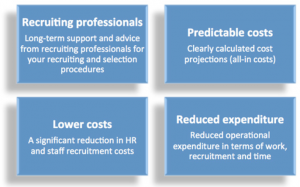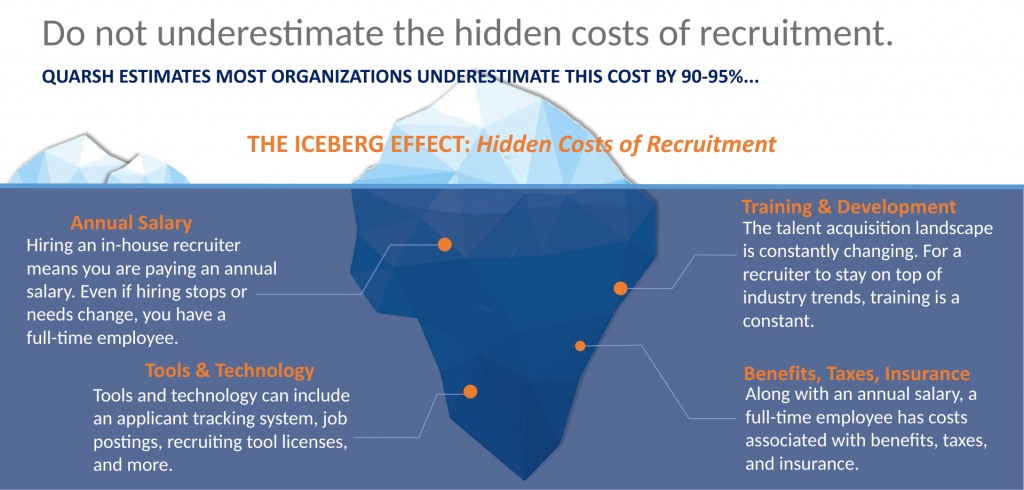
17 Jun On Startups: The Key Considerations and Hidden Costs of Common Recruitment Solutions
Once your startup reaches the emerging or expansion stages of growth, you’ve got a tough decision to make – determining the most efficient and cost-effective talent acquisition solution for your venture.
As you likely know by now, the process of hiring candidates demands a great deal of your most limited resources – time and money.
Choosing the right type of talent acquisition solution for your startup isn’t an easy call, so in this article we’ll briefly explain common talent acquisition solutions, examining their respective strengths and weaknesses along the way. We’ll then highlight the unforeseen or hidden costs you should expect to incur with each option.
In-house Recruiters
In-house recruiters are your own full-time employees that manage your company’s hiring efforts – they write job descriptions, source candidates, arrange interviews, and prepare employment offers for incoming candidates.
Depending upon location and industry, the average salary of an in-house recruiter is between 70 – 90k a year. This may seem like a cost-effective option early in your venture’s development, but there are a few things to consider before deciding to invest in this talent acquisition option.
Does the recruiter have leadership capabilities and expertise in a variety of industries? In early stage startups, recruiters often report to a CEO who has little experience using best hiring practices or effectively managing an acquisition function. Your in-house recruiter is essentially a one-man army responsible for any and all training, leadership, and guidance that goes on within the department. Simply put, your recruiting process will only be as good as your best recruiter.
Expertise in a variety of industries becomes a critical factor when you find yourself in the following situation – you’re looking to hire two data scientists, a content marketer, and a VP of sales in the coming months. Will your recruiter be educated in these disciplines enough to distinguish qualified candidates from unqualified candidates?
Will your hiring needs change dramatically over time? A significant downside of hiring in-house recruiters is that you’re paying an annual salary regardless of the amount of hiring that needs to be done. If you’re only hiring employees eight months out of the year, you’re still paying four months salary to a recruiter that doesn’t have any work to do.

It’s worth noting that you’re footing the bill for the applicant tracking system, data-mining tools, premium job boards, and any other equipment your recruiters require to work effectively.
These “hidden costs” can add up quickly – LinkedIn’s annual plan for corporate recruiters tops off at 10k alone, and when you consider the price of the other tools and equipment needed you’re easily adding an additional 20k to that 70 – 90k salary.
This isn’t to say that experienced and talented in-house recruiters can’t offer their fair share of value to your company, but there’s a reason many startups wait to build an in-house recruiting function until they grow into larger organizations – it can get costly, fast. (img source)
Contingent Recruiters
A contingent recruiter fills positions in your company similar to how an in-house recruiter does; they’ll source, screen, and communicate with candidates, sending them your way if they seem like a decent fit. However, there are a few major differences – they’re not your employee, you don’t pay them until the role you hired them to fill is filled, and they’re most likely submitting the same candidates to other clients they’re working with.
A benefit of hiring a contingent recruiter is that if they send you candidates you feel aren’t suited for the position available, you’re not required to interview them or pay the recruiter’s fee.
Because of this, contingent recruiters tend to source candidates more quickly than other talent acquisition alternatives – every minute they don’t place a candidate is a minute they’re not being paid for their efforts. Recruiters working on this “no win, no fee” basis usually spend less time focusing on projects before they move onto the next client, especially if it’s not an easy role to fill.
Contingent recruiters also send large volumes of candidates to your door, hoping that out of the many candidates sent a few will be qualified for the position. Instead of taking an in-depth look at each person’s resume, they focus on sending you available fits for positions rather than best fits.
Do you have the budget to pay contingency search fees? As mentioned above, contingent recruiters are paid placement fees after they fill a position. This fee is agreed upon between the recruiter and the client, and is generally 20 – 25% of the newly-placed employee’s first-year salary. For example, if you pay your new employee 70k annually and your agreed upon fee is 25%, you also pay the recruiter 17.5k for the successful placement.
If you’re planning on filling more than a few positions, you can imagine how these fees add up.
Are you looking to add strategic value to your acquisition process? Contingent recruiters can find candidates for you quickly, but the buck stops there – they aren’t hired to improve the effectiveness of your acquisition function or grow your venture like your in-house recruiters or outsourced recruiting partners.
When you hire a contingent recruiter you’ll still be paying for an applicant tracking system, data mining tools, and any other equipment you’ll need to categorize and interview the incoming candidates. Even after you pay the recruiter’s fee, your investment isn’t over – you’re still responsible for interviewing candidates, making offers, and hiring employees, which can take up countless hours of your limited time.
Outsourced Recruiting Partners
Partnering with an outside acquisition firm allows you to transfer all or some of your recruiting process to an outside entity – they’ll overhaul the design and management of your recruitment process, implementing best practices they’ve learned from working with hundreds of other successful clients in order to fulfill your hiring needs.
 Because talent acquisition isn’t commonly considered a core business function by many entrepreneurs, firms in earlier stages of development often benefit from the strategic approach to acquisition experienced recruiting partners provide.
Because talent acquisition isn’t commonly considered a core business function by many entrepreneurs, firms in earlier stages of development often benefit from the strategic approach to acquisition experienced recruiting partners provide.
A benefit of forming a strategic relationship with a recruiting partner is that you’re not paying for an applicant tracking system, data mining tools, equipment, or training and salaries for employees. Not only that, but you have the experience and brainpower of an entire organization at your disposal rather than one or two in-house or contingent recruiters.
Even with the aforementioned benefits, there are a few things to consider before choosing to work with an outside recruiting partner. (img source)
Do they represent you? Keep in mind that your partner will be the first face incoming candidates will see, and their successes and failures will reflect your company’s image. Whether your partner is stringing candidates along or providing an excellent candidate experience, candidates will associate your brand with your recruiting partner’s performance. Similarly, does your partner’s portrayal of your brand align with your own vision and internal culture?
Board members, entrepreneurs, and executives tend to retain their relationships with reliable recruiting partners, often bringing them to new ventures once they’ve proven their worth. Trust is a defining factor when it comes to building a strategic partnership with another entity, which is why strong recruiting partners obtain most of their business through referrals rather than through direct sales.
Are they transparent and collaborative with their decision-making processes? As with any working relationship, open communication and transparency is key. It’s critical that your partner keeps you informed of major decisions concerning your acquisition process, allowing you to decide what’s best for your business.
When you work with an outsourced recruiting partner, you pay on a per-project basis – they’ll hire however many candidates you need within your given time frame, and in return you pay the agreed-upon cost of the project.
Working with reliable partners ensures that hidden costs don’t come into play, but there may be unforeseen costs if your hiring needs dramatically increase unexpectedly. For example, if you have two recruiters working the project hiring four candidates a month and your needs jump to eight candidates a month, you’ll end up paying for the increased resources needed to provide the service.
Forming a relationship with an outsourced recruiting partner can be beneficial for emerging and expansion stage startups because they offer strategic value as well as financial value – not only do you save money on technology and equipment, but you also have the ability to scale your hiring process as your needs increase.
To conclude:

What talent acquisition alternative do you believe is the most effective for an emerging growth or expansion stage startup? Leave a comment on our LinkedIn or Facebook pages and let us know what you think!
——————————————————————————————————————————————————————————————————–
If you’re in search of talent consulting or recruiting services and could use help determining your business needs, contact our team of experienced talent acquisition consultants now.


